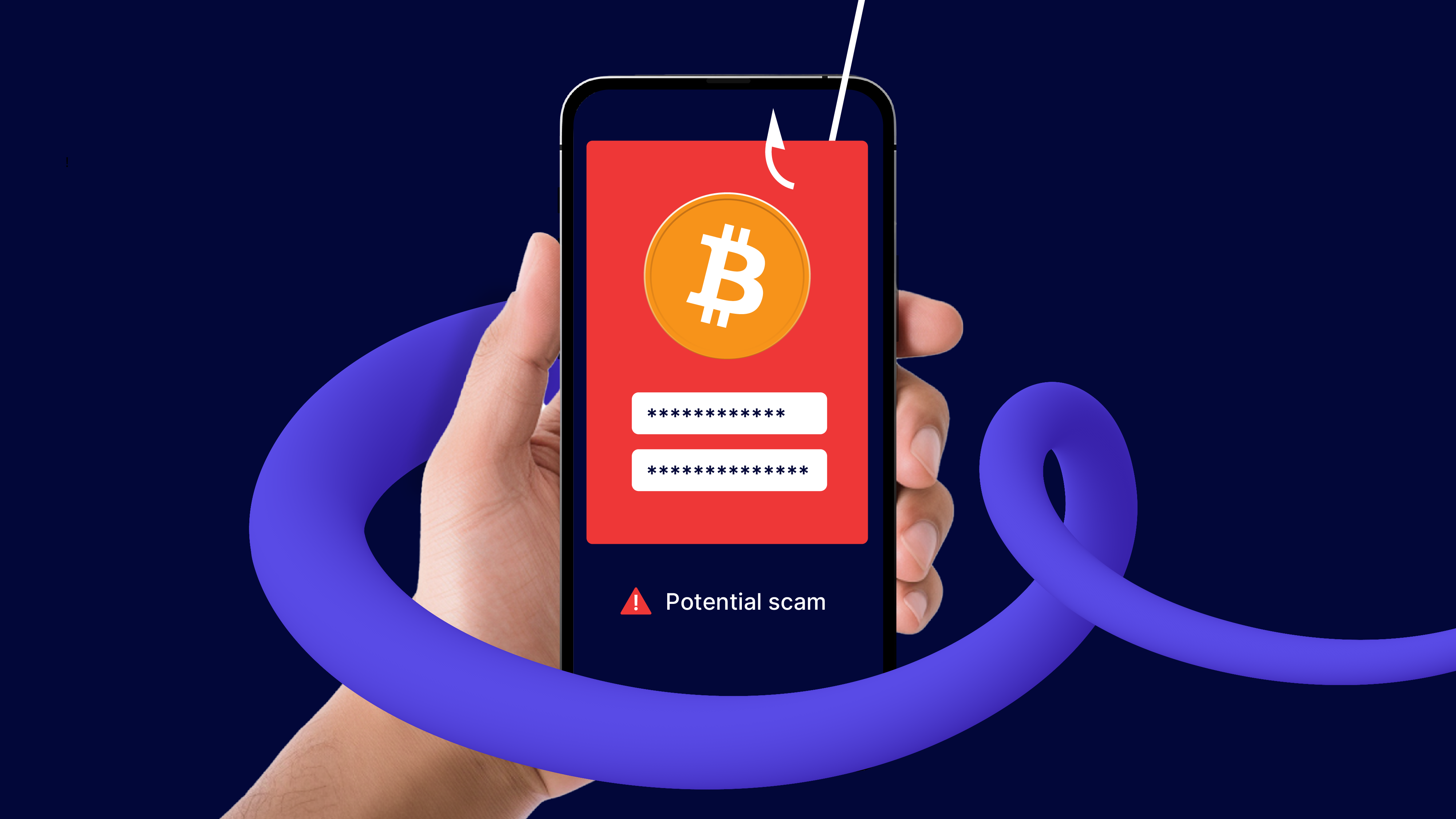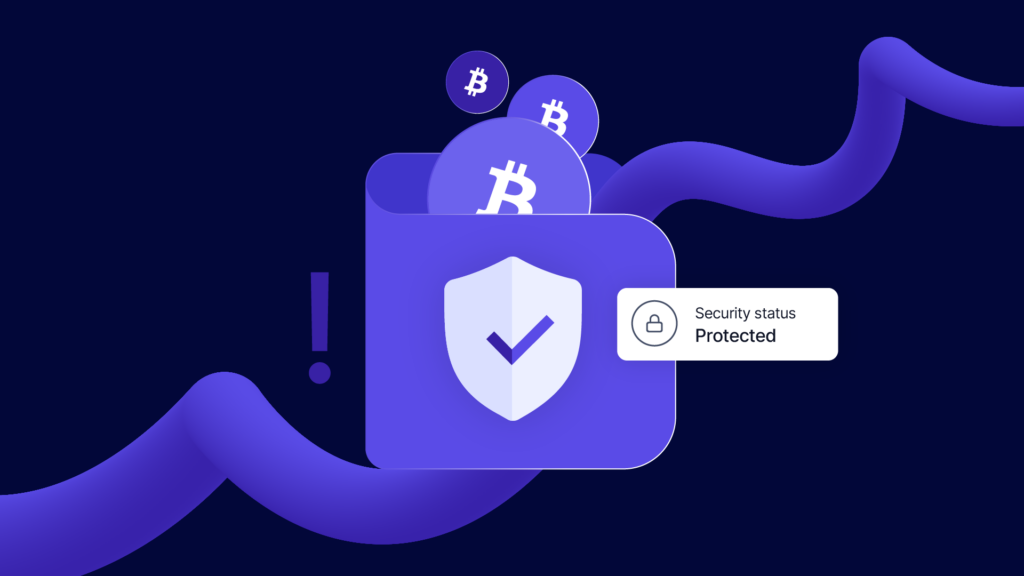
Accept crypto with CoinGate
Accept crypto with confidence using everything you need in one platform.
Crypto Scams Guide & How CoinGate Protects its Users

CoinGate has been a trusted player in the crypto industry for over 10 years, and during this time, we’ve encountered numerous attempts by scammers to defraud us and our users.
According to blockchain analysis firm Chainalysis, $24.2 billion worth of crypto was sent to illicit addresses in 2023 alone—an alarming figure that suggests fraudulent actors are working relentlessly to obtain cryptocurrency that doesn’t belong to them.
As a well-known platform, we’ve also become a prime target for fraudsters a long time ago, with some impersonating us on social media, creating fake exchanges under our name, and more.
Despite these efforts, we remain vigilant in combating these threats — and we encourage you to do the same.
In this article, we’ll explore the most common types of crypto scams, which scams are impossible when using CoinGate, and the proactive measures we take to protect you and your transactions from fraudsters.
The Most Common Types of Crypto Scams
While phishing and giveaway scams are widely known, here are some other common types of crypto fraud you might encounter in the crypto space:
- Fake Investment Platforms: Scammers often create bogus investment platforms promising high returns from crypto trading or mining. Sometimes, they even manage to integrate payment gateways, giving a false sense of legitimacy. Once users deposit funds, these scammers vanish.
- Fake ICOs/IDOs: Fraudsters lure users into buying pre-sale tokens for fake blockchain projects, claiming they are early investors in the next big crypto venture. They might leverage payment services to make the scam look more credible, despite the project being fraudulent.
- Rug Pulls: In this scheme, scammers build a crypto project, attract investment, and then abruptly withdraw all liquidity, leaving investors with worthless tokens. These scams may use payment gateways for initial purchases, making the scam appear legitimate.
- Fake Bitcoin Mining Services: These scams offer cloud mining services, claiming users can earn Bitcoin by paying for mining power. Scammers may use crypto payment platforms to collect payments before disappearing without offering any real service.
- Pump and Dump Schemes: Scammers inflate the value of a low-market-cap coin, convincing others to invest. Once the price peaks, they sell off their holdings, crashing the price. While CoinGate doesn’t facilitate crypto trading, scammers may try to make the payment process seem legitimate by using our platform.
- Compromised Accounts and SIM Swapping: Attackers often gain control of users’ accounts by using SIM swapping or malware. They can then drain crypto wallets linked to payment gateways. Though CoinGate itself is secure, compromised personal accounts outside of our platform remain vulnerable.
Our Compliance Specialist, Egidijus Gudeikis, shares: “Crypto scammers are always finding new ways to steal from others’ wallets. To stay safe, think critically, question every detail, and be vigilant about protecting your personal and wallet information. In short, navigate the crypto space with a sharp mindset, as captured by this timeless quote: ‘Believe nothing you hear, and only half of what you see.'”
Remember – you can always do more to safeguard your crypto holdings. Here are some tips and tricks that will help you protect your crypto better.
Scams You Won’t Encounter at CoinGate
Fortunately, some types of scams are impossible when using CoinGate’s platform:
- Fake Crypto Exchanges: CoinGate is not a crypto exchange, so users cannot trade cryptocurrencies directly. This means scams involving fake exchanges or trading manipulation do not apply to our users.
- Ponzi and Pyramid Schemes: Since CoinGate is strictly a payment processor, we are not involved in any ongoing investment programs. Ponzi schemes, which rely on continuous inflow of new investors, are not possible through CoinGate.
- ICO/IDO Scams Originating from CoinGate: While scammers might use CoinGate to collect payments, our platform doesn’t facilitate ICOs or token sales directly, reducing our exposure to such schemes. ICOs and IDOs typically occur on specialized blockchain platforms or exchanges.
How CoinGate Protects Its Users from Scams
We take extensive measures to protect our users from potential scams. Here’s how we safeguard both merchants and consumers:

- Merchant Vetting Process: We rigorously verify businesses and merchants that use CoinGate to ensure legitimacy. This vetting reduces the likelihood that fraudulent companies can use our platform to scam users. Our team conducts background checks and ensures compliance with relevant regulations.
- KYC/AML Compliance: CoinGate strictly adheres to Know Your Customer (KYC) and Anti-Money Laundering (AML) regulations. By requiring merchants and customers to verify their identities with the help of Onfido identity verification technology, we prevent bad actors from operating anonymously on our platform.
- Advanced Encryption and Secure Infrastructure: CoinGate employs state-of-the-art encryption techniques to protect all data transfers and interactions on the platform. This ensures the security and privacy of user information at all times. Additionally, we regularly update our infrastructure to defend against the latest cybersecurity threats, providing ongoing protection from potential hacks or breaches.
- Secure Payment Gateway: We use advanced security protocols, including SSL encryption and multi-signature wallets, to protect user data and transactions. This prevents account hacks, interception of sensitive information, and unauthorized access to funds.
- Two-Factor Authentication (2FA): We mandate 2FA for all user accounts, adding an extra layer of security. Even if scammers obtain login credentials, they won’t be able to access accounts without a secondary authentication method.
- Transaction Monitoring for Fraud Detection: Our system continuously monitors transactions for suspicious activity using blockchain analytics and crypto compliance tools like Elliptic. Unusual patterns, such as repeated transactions from the same source, are flagged for review, helping us stop fraudulent actions before they can escalate.
- Educational Resources and Alerts: We believe education is key to avoiding scams. CoinGate provides resources and alerts to inform users about common fraud tactics, such as fake investment platforms and phishing schemes. This helps users recognize red flags and stay vigilant.
- Secure Crypto Payments Conversion: Our platform offers merchants the option to convert crypto payments into fiat or other digital assets automatically. This protects users from price manipulation schemes like pump-and-dumps or rug pulls by providing a stable conversion option.
- Merchant Reputation System: Merchants that maintain trustworthy transactions can build positive reputations on our platform. This helps users identify legitimate businesses and avoid bad actors.
By following these steps, we can ensure a secure and reliable platform for processing crypto payments and handling funds, effectively helping users avoid the growing number of scams in the industry.
Whether you’re a merchant or a consumer, knowing how these scams work and how you can protect yourself will go a long way. Stay safe!
And, if you’re thinking about accepting cryptocurrency payments in your business, be sure to sign up for a CoinGate account.
Accept crypto with CoinGate
Accept crypto with confidence using everything you need in one platform.

